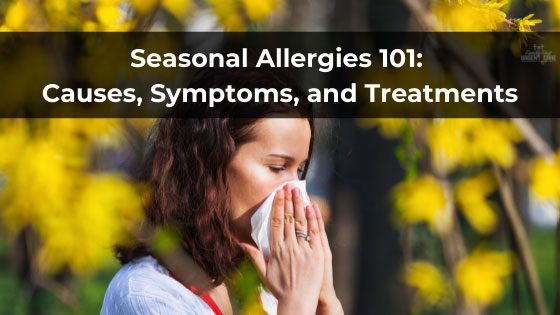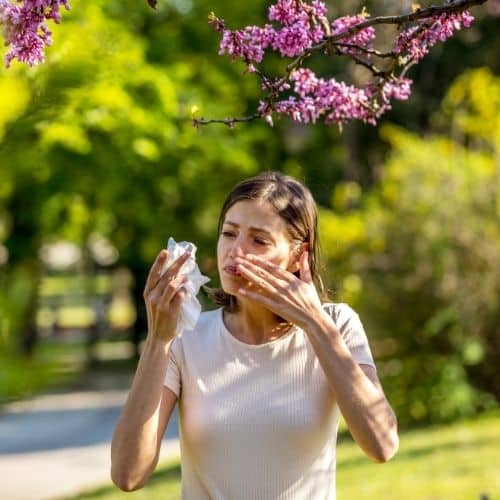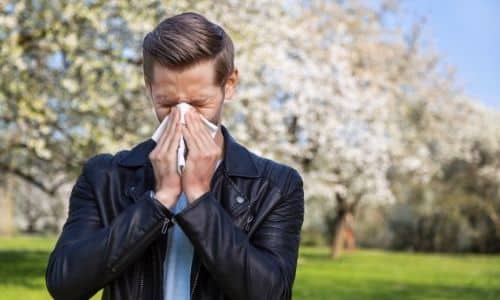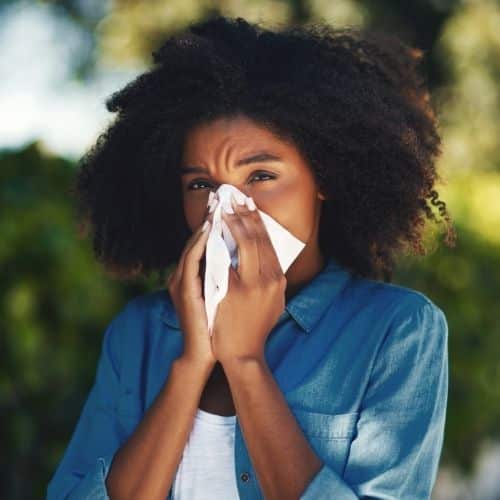
Those in Conroe, TX and the surrounding areas who suffer annually from seasonal allergies likely wouldn’t be surprised to find their city ranked number 34 in the Asthma and Allergy Foundation of America’s List of 2022 Allergy Capitals. In fact, as of March, the 2022 allergy season is springing up faster and with more intensity in south Texas than it typically does this time of year. This means that millions of individuals who suffer from seasonal allergies to pollen, grass, and mold are probably finding it a little harder to breathe easy right now, prompting many to drop by their local urgent care for some much-needed relief.
What Types of Seasonal Allergies Are Common in South Texas?
Most people who experience seasonal allergies find that they come in waves, depending on the season. For spring in Conroe and the surrounding areas, there are three primary offenders:
- Tree pollen. The most common offenders for tree pollen are usually Hackberry, Ash, Sweet Gum, Pine, and Oak trees. As the blossoms come out on these trees, they then release pollen which the wind transports into the air. The end result is typically a significant coating of the yellow substance on top of cars, street signs, and even street curbs. And if you can see pollen in abundance in these places, be certain that it is also present in the air you are breathing.
- Weed and grass pollen. In late spring continuing through summer, grass pollen circulates the same way that tree pollen does. The grass pollens that can cause allergy sufferers the most angst are Bahia, Bermuda, Blue, Orchard, Red Top, Swet Vernal, and Timothy. Ragweed is the most common offender for weed pollen.
- Mold spores. Of these three, mold spore numbers frequently tend to be the lowest category comparatively but can still cause symptoms for those with allergies.

Symptoms of Seasonal Allergies in Houston
When pollen is at its peak in the spring, it is everywhere. Even getting out of the car to walk into a school or grocery store, people are likely to breathe it in. If spending time outside to play sports or just enjoy the day, pollen granules can adhere to your skin, clothes, and hair so that when you return indoors, you are unknowingly bringing the pollen in with you.
The ongoing presence of pollen, particularly in the days and weeks where the counts are the highest, is what can make seasonal allergies such a challenge. Some of the most typical symptoms of allergies include:
- Sneezing
- Runny nose (discharge is typically clear in color)
- Stuffy nose
- Sinus pressure
- Red, irritated, and watery eyes
- Swollen eyes
- Itchy eyes, nose, mouth, and even ears

The symptoms are more irritating than they are concerning but can still make those who suffer from seasonal allergies rather miserable. This problem can be further compounded for individuals who already suffer from a respiratory disease or asthma.
If the pollen is abundant and affects you negatively, it will likely continue to be a problem for you until those counts go down again. However, there are steps you can take to better protect against seasonal allergies.
How Are Pollen Allergies Treated?
The most important thing to note about pollen when the numbers are high is that it is almost impossible to avoid. However, there are some things individuals can do to minimize the impact of pollen, such as:
- Drive with the windows up in your vehicle.
- Change clothes after being outside.
- Shower before bed to keep pollen from your skin and hair transferring to your pillow and bed.
- Limit your time outdoors.
While these steps can go a long way toward protecting against seasonal allergies, they may not be enough. In cases like these, it is recommended to see a healthcare professional that can assist with the treatment of symptoms. A prescribed course of treatment might include:
- Antihistamines. These are designed to provide relief to itchy eyes and an itchy, runny, and/or stuffy nose. There are a wide variety of antihistamines on the market which are not a one size fits all solution, depending on other underlying conditions an individual may have. Your urgent care provider can help you determine whether this is a valid option for you.
- Nasal corticosteroid sprays. These sprays are generally for limited daily use and help reduce swelling and inflammation of the nose as well as block reactions to pollen. While these can be effective at treating multiple symptoms of seasonal allergies, they may take a little time to begin working at optimum levels.
- Decongestants. Although these may help relieve some symptoms, decongestants are for limited use only and may not be appropriate for everyone. Your provider can help you determine if decongestants are right choice for your allergies.

Why Urgent Care May Be Your Best Bet for Allergy Relief
Higher pollen counts in the spring usually mean that those individuals allergic to pollen suffer together. Although it is said that misery loves company, much of the population suffering from symptoms at one time may make it more difficult to schedule an appointment with a primary care physician.
Fortunately, neighborhood urgent care centers are staffed with knowledgeable healthcare providers that can help treat seasonal allergy symptoms. And urgent care centers also make getting medical attention faster and more convenient.
While most doctor offices still adhere to normal business hours of nine to five, urgent care centers are generally open beyond five in the evening to allow time for patients just getting off of school or work to still make it in before closing. In addition, many of these centers are also open for limited hours on the weekend for maximum convenience.
Patients balancing work and family often find it difficult to schedule an appointment they can actually make. Urgent care centers do not require appointments and welcome walk ins. This allows patients to come in at their convenience instead of trying to move around their schedule to accommodate someone else’s.
If you or someone you know are suffering from seasonal allergies, visit your local urgent care today. Don’t let allergies sideline you from the mild temperatures, sunshine, and the abundant joys of spring.
- The Dangers of Heat Stroke - August 2, 2022
- Health Devices and Supplies For Home - July 19, 2022
- Hydration for Houston’s Summer Heat - July 1, 2022



